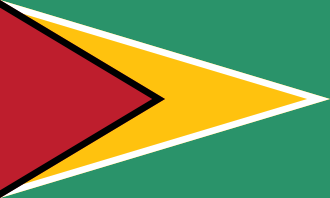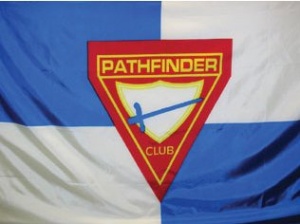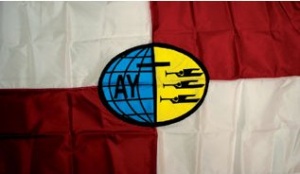Difference between revisions of "AY Honors/Christian Citizenship/Answer Key 6"
Jomegat bot (talk | contribs) m (honor_header -> honor_desc) |
|||
| Line 1: | Line 1: | ||
| − | {{ | + | {{honor_desc |
| + | |honorname=Christian Citizenship (Guyana) | ||
| + | |skill=1 | ||
| + | |year=1938 | ||
| + | |category=Outreach | ||
| + | |authority=General Conference | ||
| + | |insignia=Christian_Citizenship.png | ||
| + | |secondary=true}} | ||
==1. Describe the national, state or provincial, AY, Pathfinder, and Christian flags.== | ==1. Describe the national, state or provincial, AY, Pathfinder, and Christian flags.== | ||
Revision as of 03:19, 11 September 2014
1. Describe the national, state or provincial, AY, Pathfinder, and Christian flags.
Current state/provincial flags
Guyana is divided into ten regions:
- Barima-Waini
- Cuyuni-Mazaruni
- Demerara-Mahaica
- East Berbice-Corentyne
- Essequibo Islands-West Demerara
- Mahaica-Berbice
- Pomeroon-Supenaam
- Potaro-Siparuni
- Upper Demerara-Berbice
- Upper Takutu-Upper Essequibo
- Provincial flag.jpg
Provincial flag - Provincial flag.jpg
Provincial flag - Provincial flag.jpg
Provincial flag - Provincial flag.jpg
Provincial flag
2. Know how to display the national flag with two other flags under the following situations:
a. Camp out/camporee
b. Fair
c. Pathfinder Day program
d. Parade
3. Demonstrate how to fold and salute your national flag. Mention when and how it should be displayed.
Folding
- Have two people stand on either end of the flag, holding a corner in each hand.
- Fold the flag in half twice, length-wise.
- Beginning at the red end, fold one corner into the opposite side of the flag, forming a triangle.
- Repeat this triangular folding until only the top edge of the flag shows.
- Tuck this end into the triangle.
Be sure to keep the flag from touching the ground while folding.
Flag Protocol
4. Explain the meaning of and reason for the National Anthem, and recite the words from memory.
5. Give the rights and responsibilities of a citizen of your country.
Rights
Responsibilities
6. Have an interview with a local, regional, or national official of your country, and learn about his duties.
It is generally easier to get a local official to agree to an interview, though it is often more exciting to interview a more prominent person. The interview can be accomplished during a club meeting, and multiple Pathfinders can ask questions. Invite your guest well ahead of time, and make sure everyone in the club is on time. A visit by an official would be a very good reason to have everyone in the club wear their class A uniforms. If desired, you can make up several questions ahead of time, writing them on index cards, and distributing them to the members of your club. But do not be so rigid as to not allow them to ask spontaneous questions. Having questions prepared ahead of time on index cards are a good way to get things rolling. Here are some suggested questions:
- Could you describe a typical day at work?
- What is the most difficult part of your job?
- What is the most satisfying aspect of your job?
- To whom do you report?
- How did you get your position? Were you elected, appointed, or hired?
- How should a young person prepare for a life of public service?
7. Write a one-page essay or give a two-minute oral report about a famous person in your country. Mention what he has done to gain his recognition.
This would be an excellent opportunity to present a worship during the opening exercises of a regular club meeting. Encourage your Pathfinder to choose a person they are personally interested in. If they cannot think of anyone themselves, have a list of suggested persons at hand and encourage them to choose from the list. Famous people might be historical figures, politicians, actors, sports stars, or anyone else. It would be preferable to choose a person who has been a positive influence on the country.
Although the requirement asks that you "mention what he has done to gain his recognition," this should not be interpreted as excluding women. Men are not the only famous people in a country.
8. Do one of the following:
a. Make a list of ten famous quotations from leaders of your country.
b. Make a list of ten famous historic places in your country.
c. Make a list of ten famous historic events in your country.
9. Describe what you can do as a citizen to help your church and country.
The best way to help either your church or your country is by getting involved. Edmund Burke, an English philosopher summed this up when he said "The only thing necessary for the triumph of evil is for good men to do nothing."
In your church, this means that you will show up for services on a regular basis. It also means you will support it with your tithes and offering, show up for business meetings, and not wait to be asked before you volunteer your services. If you see something that needs done, do it. If you do not have the skill to do it, or you think that you need permission first, talk to your pastor, an elder, deacon, or deaconess. Find your ministry!
For your country, it is much the same. Show up for public meetings, stay informed about the issues of the day, vote if you are eligible, and pay your taxes fairly and promptly.
10. Go through the steps of an individual acquiring citizenship in the country and learn how this is done.
11. Know how to explain the process of government in your country.
12. Explain the meaning of this statement Jesus made in Matthew 22:21: "Render therefore unto Caesar the things which are Caesar's, and unto God the things that are God's.
This verse teaches that governmental authority is to be respected, as long as it does not conflict with the moral obligations of being a Christian. Government serves a holy purpose; preserving social order, promoting the well-being of its citizens, and protecting their safety. If you believe that this does not apply today because you see the government as corrupt, you are urged to research the Roman government of the first century A.D. when these words were spoken by Jesus. Was Herod corrupt? Was Pilate just?




